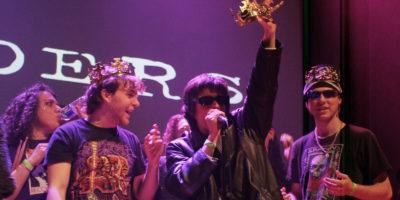By Andrea Nene
Wesley French walks out of rehearsal confused — he thought he was at opening night.
Jamie Sussman has insomnia. When she finally does fall asleep, it’s not for long — she is jolted awake, in character, and blurts out a line.
And three weeks since rehearsals started, director Duncan McIntosh is right: The two third-year students starring in Nana are becoming their characters.
Nana, the Ryerson Theatre School’s fourth production this season, has been realized by 50 third-year theatre students — 25 of whom are in theatre technical production — for course credit.
The two-act play was written as a novel more than 100 years ago by Emile Zola about the dark side of the rich and the beautiful. Nana, an urban working class woman from the slums, has no talent and can’t sing, but she has a certain energy — which helps her to become first an actress, and then a courtesan. She is not ashamed of her sexuality and she uses her body as a tool to get the things she wants: Money, fortune and fame. Men are mesmerized by the way Nana moves and they surrender to the temptation of what they can’t have.
“Picture Hooker Harveys meeting Prince William,” explains Ryerson alumnus McIntoch, adding that Nana can be seen today in no-talent stars who attract publicity. “She turns up every three or four years — sometimes in multiple personalities like the Spice Girls.”
McIntosh was asked to direct Nana for the 30th anniversary of the theatre school. He has commissioned or produced more than 150 professional productions, including Cavalcade at the Shaw Festival and has received national and international awards.
When Zola adapted the play in 1881, Nana was labelled obscene and the novel was banned in England. Nana shocked the critics — probably because two men share a kiss in the play.
In that particular scene, Fauchery (Jeff Henderson) steps in to play Nana. ‘She’ wants something from the aristocrat Muffat (French) and she kissed him to get it.
As the director, McIntosh’s job if to encourage the creative mind of his actors. He says it doesn’t take much — just the concentration to let yourself change.
In the scene where French and Henderson kiss, McIntosh’s approach was to start in a way that was more socially permissible. So he told French and Henderson to wrestle at the start of the rehearsal. After twenty minutes they knew how each other’s body felt. They were comfortable with touching each other and lips were no different. The kiss lasts three to four seconds.
McIntosh teaches the actors three things to be creative: connect with the other actors onstage, listen to the things inside of them that will make the character work and know that they’re enough to play their roles.
And that’s why casting is so important.
For McIntosh, casting is also intuitive. He looks for an aspect of the character which relates to the actor and couples them.
When casting for Nana, McIntosh looked no farther than Sussman.
“When I first saw her I thought she was vivacious, bright, really good natured and had a great laugh,” McIntosh recalls. “When I heard her laugh I thought she was perfect. That good naturedness is the same as Nana.”
McIntosh cast French as Muffat because of his tall and beautiful presence — traits that reminded the director of a nobleman. And because Muffat is a reserved character who doesn’t let his emotions get the better of him, French’s seriousness was ideal for the role.










Leave a Reply